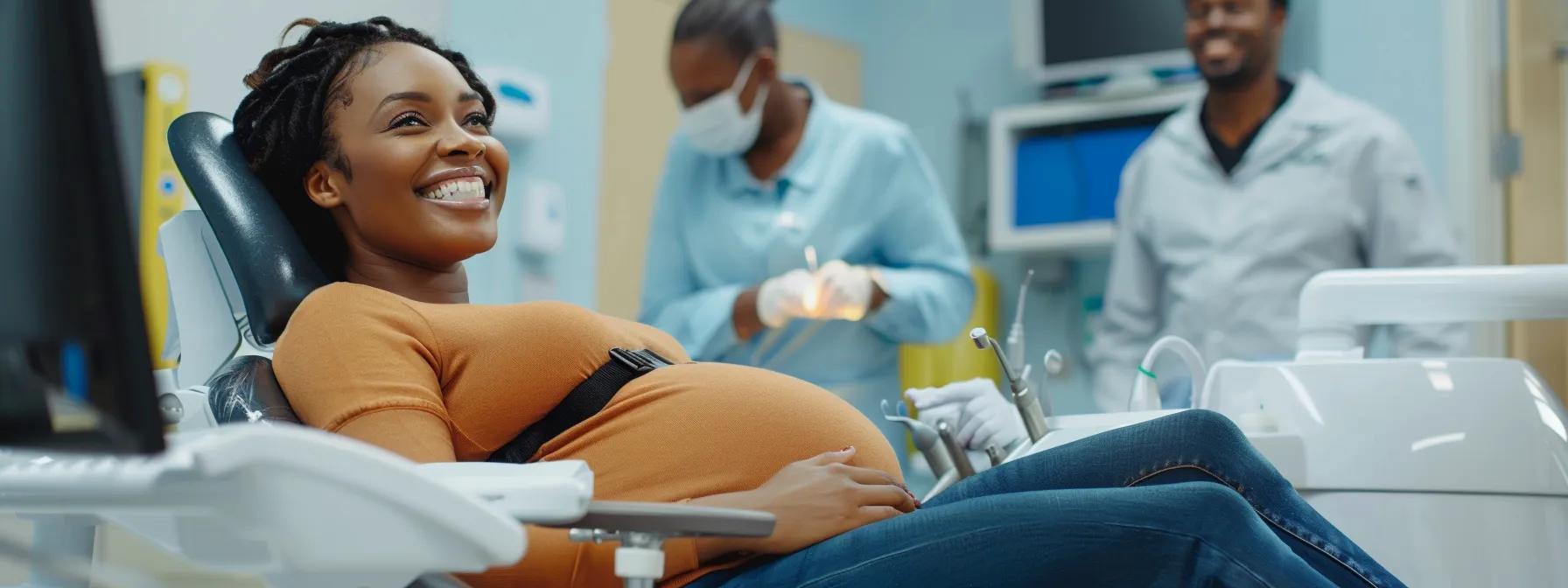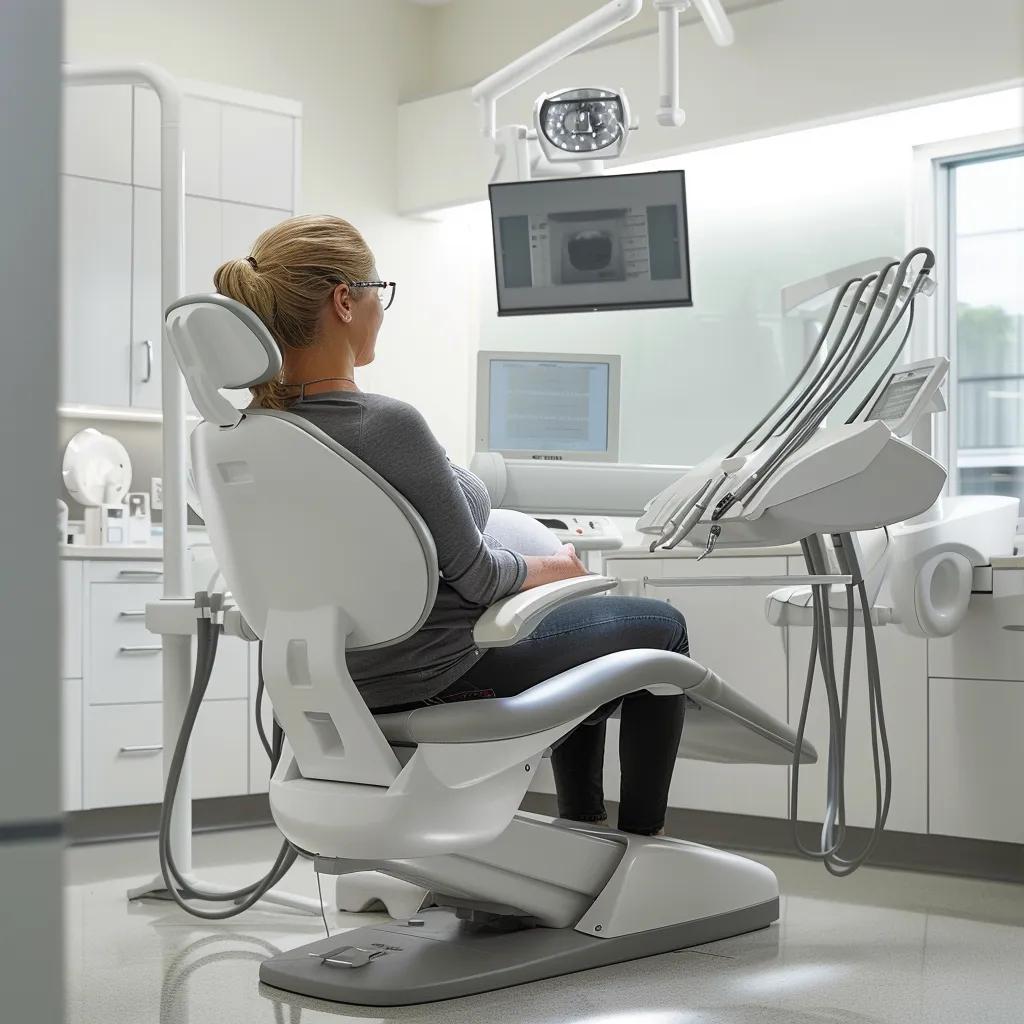Pregnancy and Dental Emergencies: A Delicate Balance
Pregnancy is one of life’s most transformative journeys. As your body supports the growth of new life, it also undergoes significant hormonal and physiological changes—many of which can impact your oral health. In fact, studies show that pregnancy-related hormone fluctuations can make gums more sensitive and teeth more prone to infection, inflammation, and even injury. That’s why dental emergencies during pregnancy require a unique blend of urgency, caution, and compassion.
While many expectant mothers are hesitant to seek dental care during pregnancy, fearing it may harm the baby, the truth is that timely treatment is often not only safe—it’s essential. Left untreated, dental infections and pain can contribute to serious complications, including low birth weight and preterm delivery. At Grand Prairie Family Dental, we offer safe, comfortable emergency dental care tailored specifically to the needs of pregnant women. Because your well-being—and your baby’s—should never be compromised.
Common Dental Emergencies During Pregnancy
Understanding which dental emergencies are most likely to occur during pregnancy can help you respond with confidence and clarity. With increased inflammation, shifting oral bacteria, and greater demands on the body’s immune system, the risk for oral issues intensifies. Unfortunately, many of these issues can progress quickly if left unaddressed.
Here are four of the most common dental emergencies that pregnant women may encounter, each requiring special attention due to the unique demands of pregnancy.
Severe Toothache or Infection
One of the most common complaints we hear from expectant mothers is a persistent, throbbing toothache. Hormonal changes can increase gum sensitivity and reduce your body’s natural ability to fight bacteria. Combine that with any preexisting dental decay, and a small cavity can rapidly turn into a deep infection. Severe tooth pain is not something to brush off during pregnancy—it may signal an abscess, pulpitis, or bacterial infection.
If left untreated, a dental infection can enter the bloodstream and affect the entire body. In rare cases, this can even lead to sepsis or trigger an inflammatory response that affects fetal development. At the first sign of serious tooth pain—especially if it’s accompanied by swelling, fever, or a bad taste in the mouth—call your dentist immediately. Early treatment can eliminate the infection and prevent harm to both mom and baby.
Gum Disease and Pregnancy Gingivitis
Gum disease is another widespread concern among pregnant patients. In fact, pregnancy gingivitis affects up to 70% of expecting mothers due to increased blood flow and heightened immune response in the gum tissue. This condition may start with mild symptoms like redness, swelling, and occasional bleeding during brushing, but can rapidly escalate without proper intervention.
Untreated gum disease can lead to periodontitis, an advanced infection that affects the bone and can increase the risk of low birth weight and preterm birth. Warning signs include gum recession, loose teeth, persistent bad breath, and pain when chewing. Fortunately, pregnancy-safe cleanings and regular dental checkups can stop the progression of gum disease and keep both mother and baby healthier.
Dental Trauma (Fractures, Knocked-Out Teeth)
As the body’s center of gravity shifts during pregnancy, falls become more likely—especially in the second and third trimesters. A sudden stumble or impact can easily result in dental trauma such as cracked teeth, chipped enamel, or even a knocked-out tooth. These injuries can be painful, emotionally distressing, and in some cases, require urgent care.
If you suffer dental trauma while pregnant, rinse your mouth gently with warm water and use a cold compress to manage swelling. If a tooth is knocked out, place it in a small container of milk or your own saliva and get to the dentist immediately. Dental professionals can reimplant teeth if treatment occurs quickly. Your dental team will avoid unnecessary X-rays or medications while ensuring the safety of your fetus throughout the treatment process.
Abscesses and Swelling
An abscess is a painful, pus-filled infection that forms beneath the tooth or in the gums. Pregnant women with untreated cavities or gum infections are particularly vulnerable to developing abscesses, especially if the immune system is already weakened by pregnancy. The symptoms are hard to ignore: intense pain, swelling in the face or jaw, fever, or difficulty swallowing.
These infections pose a serious risk and should never be left untreated. If you experience these symptoms, call your dentist immediately and do not attempt to drain or treat the abscess at home. Emergency dental care will involve drainage of the infection and antibiotics that are safe for use during pregnancy. Acting quickly helps prevent systemic spread and ensures better outcomes for both mother and child.
Safe Emergency Dental Care: What Pregnant Patients Need to Know
One of the biggest concerns for pregnant women in dental emergencies is the safety of dental procedures. Questions about X-rays, anesthesia, and medication are understandable—but rest assured, emergency dental care is both safe and essential during pregnancy when approached with proper safeguards.
Dental procedures can typically be performed safely at any stage of pregnancy. However, the second trimester (weeks 13–27) is generally considered the best time for non-emergency treatments. During emergencies, treatment will focus on resolving pain and infection while minimizing risk to the fetus. Here’s what you should know:
- Local anesthesia is safe: Lidocaine without epinephrine is commonly used to numb pain without crossing the placenta.
- X-rays are limited and shielded: Digital X-rays use very low radiation, and abdominal shields are always used to protect the baby.
- Pregnancy-safe medications are available: Acetaminophen is preferred for pain, and antibiotics such as amoxicillin or clindamycin are safe for most patients.
Dentists will avoid sedatives, nitrous oxide, and unnecessary interventions, especially during the first trimester. The key is open communication—let your dental team know you’re pregnant and which trimester you’re in so they can tailor treatment accordingly.

What to Do If You Experience a Dental Emergency
Dental emergencies can happen at any time—and when you’re pregnant, knowing how to respond can help reduce anxiety and improve outcomes. The most important thing is to remain calm and take appropriate steps to protect your oral and overall health.
If you’re experiencing a dental emergency during pregnancy, follow these steps:
- Rinse gently: Use warm salt water to clean your mouth and reduce bacteria.
- Apply a cold compress: This helps manage swelling and pain.
- Take safe pain relief: Acetaminophen is the preferred option for most pregnant women.
- Call your dentist right away: Let them know your trimester, symptoms, and if you’re on any medications.
- Know when to go to the ER: If you have difficulty breathing, intense facial swelling, or high fever, go to urgent care immediately.
Dental professionals are trained to care for pregnant patients safely. Share your medical history, current medications, and OB-GYN contact info to ensure the best, most coordinated care.
Preventive Strategies for Pregnant Patients
The best way to manage dental emergencies is to prevent them from happening in the first place. Pregnancy is a time to be proactive about your health—including your oral hygiene routine. Making a few small changes can dramatically reduce your risk of infections and dental complications.
To maintain strong oral health during pregnancy:
- Brush and floss daily: Use a soft-bristled brush and fluoride toothpaste.
- Rinse after vomiting: Morning sickness exposes teeth to acid. Rinse with water or baking soda to neutralize acidity.
- Limit sugar and snacks: Frequent snacking increases cavity risk. Choose calcium-rich foods instead.
- Stay hydrated: Water helps neutralize acids and rinse away food particles.
- Visit your dentist regularly: Schedule cleanings and exams, especially in the second trimester.
Good oral hygiene supports not just your health but your baby’s as well. Taking these preventive steps can lower your risk of dental emergencies and give you peace of mind throughout your pregnancy.
Grand Prairie Family Dental: Compassionate Care for Expectant Mothers
At Grand Prairie Family Dental, we know that pregnancy is a time of heightened emotions and unique health needs. That’s why our team goes above and beyond to provide gentle, pregnancy-safe emergency dental care that’s tailored to you. From the moment you walk through our doors, we prioritize your comfort, safety, and well-being.
Here’s what sets our care apart:
- Same-day emergency appointments to provide fast relief and protect your baby’s health.
- Specialized training in treating pregnant patients with sensitivity and clinical precision.
- Pregnancy-safe medications and techniques to manage pain, infection, and anxiety.
- Coordination with OB-GYNs to ensure your overall medical care is aligned.
- Flexible payment plans and in-house membership options to reduce financial stress.
Our goal is to give you the highest quality dental care in an environment that feels safe, supportive, and empowering. Whether you’re in pain, dealing with swelling, or just unsure about next steps, we’re here to guide you with compassion and expertise.
Book an appointment with Grand Prairie, TX’s top dentist, Dr. Khademazad, today. It’s the first step to a better smile and increased self-esteem. Call us at 972-988-0900.
Schedule Your Consultation Today!
Grand Prairie Family Dental
2475 W Pioneer Pkwy Grand Prairie, Texas, 75051
Google Reviews: See More Reviews From Grand Prairie Family Dental
View information about local places in our community.
Driving Directions to Our Practice
FAQs
Is it safe to get dental treatment while pregnant?
Yes. With the right precautions, dental care during pregnancy is not only safe—it’s recommended. Emergency procedures can be performed in any trimester, while routine care is ideal during the second trimester.
What pain medications are safe for dental emergencies during pregnancy?
Acetaminophen (Tylenol) is generally considered the safest choice for pregnant women. Avoid aspirin and NSAIDs unless prescribed by a healthcare provider.
What should I do if I have a toothache or swelling while pregnant?
Rinse your mouth with warm salt water, apply a cold compress, and take acetaminophen if needed. Then call your dentist as soon as possible. If you have trouble breathing or a high fever, go to the ER.
Related Articles
Emergency Tooth Extraction, Dental Emergencies, Tips for Emergency Dental Care, Dental Emergency Symptoms, Emergency Dental Procedures, Emergency Dental Insurance, Dental Trauma and Injuries, Lost a Filling or Crown






